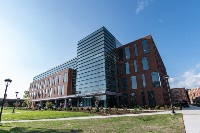
Engineering Physics combines courses in engineering, physics, chemistry and mathematics to gain a comprehensive understanding of the interplay between these fields. It enhances students' knowledge of the physical world while equipping them with the skills to apply physics in solving challenges in our rapidly evolving, technology-driven society.
The Engineering Physics B.S. degree program at Marian University provides a challenging yet rewarding experience for undergraduate students to develop as transformative engineering leaders and impactful global citizens, with an education rooted in Franciscan values. Graduates can pursue careers in research and development, science, engineering, education, medicine, business, and more.
 Our engineering programs are housed in the state-of-the-art Witchger Engineering Building. Here students have access to:
Our engineering programs are housed in the state-of-the-art Witchger Engineering Building. Here students have access to:
Most of our spaces are equipped with smart AV technology to facilitate multimodal learning.
The Engineering Physics B.S. degree curriculum provides a strong background in core engineering and science courses with an emphasis on:
The Engineering Physics program requires 128 semester credit hours for graduation.
Note: a minor is required for graduation at Marian University.
Engineering Physics Major Core Requirements (30 hours)
Engineering Physics Major Requirements (6 – 7 hours) (CHOOSE 2)
Engineering Physics Electives (EGR 200 and above, CST 200 and above, MAT 305 and above, CHE 300 or 425) (24 hours)
Additional Elective Credits (Including Minor) (35 hours)
Note: This plan is only a sample and will vary by student and course availability.
A minimum 2.0 cumulative GPA and a minimum 2.0 major GPA are required for graduation. To meet degree requirements, some disciplines require higher grades in each course or a higher cumulative GPA.
Course descriptions can be found on our online Course Catalog.